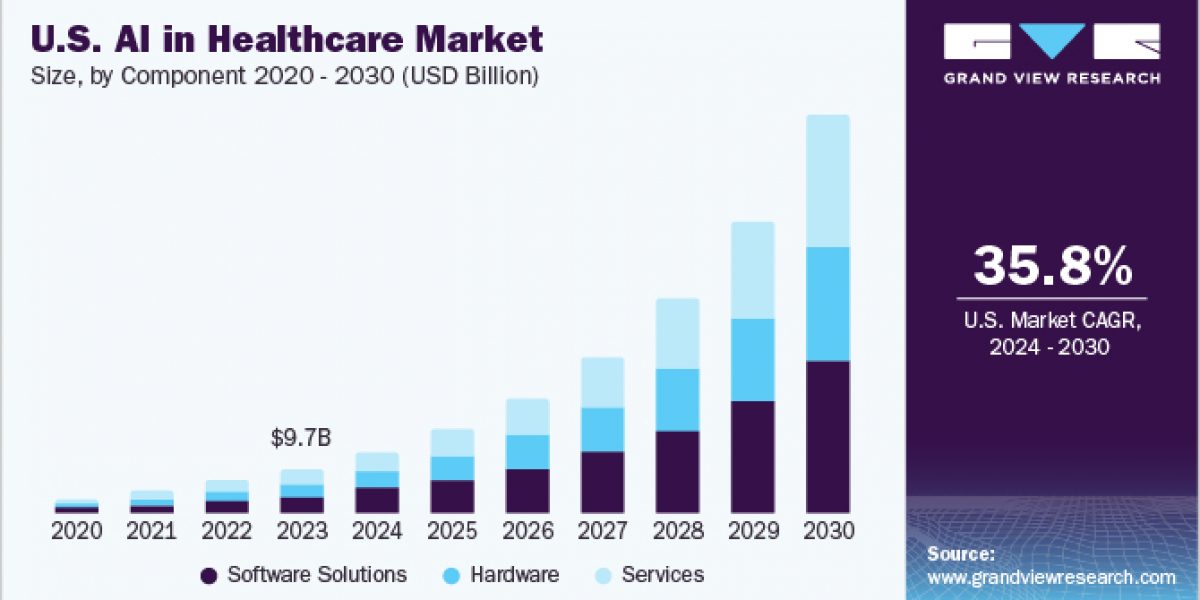The global market for AI in healthcare was valued at approximately USD 19.27 billion in 2023, with projections indicating a remarkable growth rate of 38.5% CAGR from 2024 to 2030. A significant driver of this market growth is the increasing demand within the healthcare sector for improved efficiency, accuracy, and enhanced patient outcomes. A study conducted by Microsoft and IDC in March 2024 revealed that 79% of healthcare organizations are currently implementing AI technology. Furthermore, the return on investment (ROI) from AI initiatives is typically realized within just 14 months, yielding an impressive USD 3.20 for every USD 1 invested in artificial intelligence.
AI technologies have transformative potential across various domains, including medical imaging analysis, predictive analytics, personalized treatment planning, and drug discovery. These advancements could fundamentally change traditional healthcare practices, making them more effective and responsive.
Gather more insights about the market drivers, restrains and growth of the AI In Healthcare Market
Additionally, the rapid growth in healthcare data—from sources such as electronic health records (EHRs), medical imaging scans, wearable devices, and genomic sequencing—presents substantial opportunities for AI-driven solutions. These technologies can extract actionable insights and facilitate clinical decision-making, enhancing the quality of care. The current shortage of healthcare professionals is also propelling the adoption of AI and machine learning (ML) technologies. According to estimates from the World Economic Forum in May 2023, there will be a global deficit of 10 million health workers by 2030. Consequently, AI algorithms can be trained to analyze patient health data, providing care providers with valuable support for rapid diagnosis and treatment planning.
Moreover, supportive government initiatives, the impact of the COVID-19 pandemic, and an increase in technological collaborations and mergers and acquisitions (M&A) have all contributed to the accelerated growth of the AI healthcare market, further fostering the adoption of these innovative technologies.
Component Segmentation Insights
The software solution component segment is projected to experience the fastest growth rate, with a compound annual growth rate (CAGR) of 38.7% during the forecast period. This rapid expansion can be attributed to the increasing adoption of AI-based software solutions among healthcare providers, payers, and patients. A notable example of this trend occurred in September 2019, when GE Healthcare collaborated with five local software developers in China—12Sigma Technologies, Biomind, Shukun Technology, Yizhun Medical AI, and YITU Technology—to jointly develop the Edison AI platform. This partnership aimed to facilitate GE Healthcare’s digital transformation and enhance the integration of AI in healthcare services.
Additionally, the services component segment is expected to see substantial growth from 2024 to 2030. This growth is largely driven by the expanding use of AI-based technologies across a variety of healthcare applications. Key areas of application include clinical trials, virtual assistants, robot-assisted surgeries, dosage error reduction, and fraud detection. The increasing penetration of these technologies is significantly contributing to the demand for services that can support their implementation and optimize their effectiveness in healthcare settings.
Order a free sample PDF of the Market Intelligence Study, published by Grand View Research.









